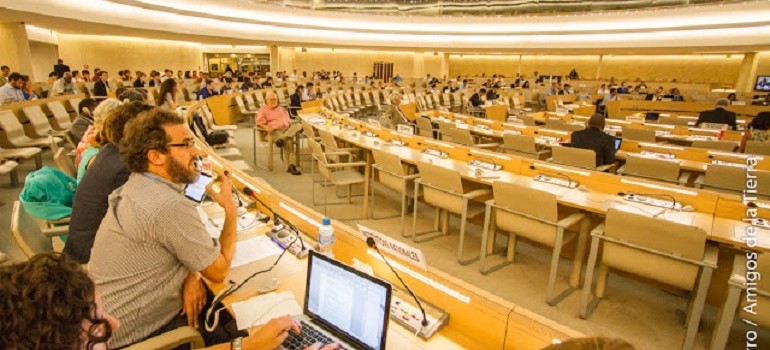
Madame Chair,
With economic globalization, transnational corporations (TNCs) have become major and powerful actors, and their activities, directly or indirectly, have a huge impact on human rights. A few hundred TNCs now control the bulk of the production and marketing of goods and services around the world. It is estimated that 80% of trade takes place within value chains linked to TNCs, a position that gives them unprecedented power. Moreover, the changes that have taken place in the banking sector and the concentration of financial capital in the hands of a few transnational corporations are now a threat not only to the real economy but also to democracy. It has been shown that one of the major obstacles to the full realization of all human rights, particularly economic, social and cultural rights, is the concentration of economic and political power in the hands of these corporations.
TNCs use a transnational structure and complex arrangements to circumvent national jurisdictions and avoid taking responsibility for violations of human rights or labor law, or for damage to the environment, and also in order to evade taxation. They also resort to bribery and sometimes use paramilitary groups to silence any opposition to their projects. This makes it extremely difficult to ascertain who is ultimately responsible for human rights violations or crimes.
What has actually happened is that, with the connivance of some powerful States and by means of numerous trade and investment agreements, TNCs have arrogated to themselves all rights and benefits while assuming no liability for their actions, frequently offloading their responsibility onto their subsidiaries, licensees or contractors or even asking the State to bail them out.
Regardless of whether the government shows political determination or tacit consent in a given country or under given circumstances, many States are quite powerless to stand up to the economic might of TNCs. Some TNCs are actually richer and more powerful than the States that are trying to regulate them – most States are simply unable to do so. Thus, whereas the United States has just made the BP oil company pay $18.7 billion for the oil spill in the Gulf of Mexico in 2010, Chevron’s victims in Ecuador are still waiting for justice and reparation after 22 years of litigation and despite a conviction handed down by the Ecuadorian courts.
The North-South dimension in this issue is plain to see. Over 80% of TNCs have their head offices in a country in the North and the vast majority of these unpunished crimes are committed in the South.
Yet there is still no international mechanism to monitor and sanction these corporations. On the contrary, a plethora of free trade and investment treaties permit them to take legal action at the international level even against States, for any government decision that goes against their interests, their investments or even their future profits. A judgement was recently handed down against Egypt for having raised the minimum wage from 41 to 72 euros! And Sweden’s Vattenfall group is claiming nearly 5 billion euros in « damages » from Germany, for its decision to phase out nuclear power by 2020! So there is a huge disparity between the international instruments that TNCs have to defend their interests and those we have to ensure respect for human rights, labor law and environmental protection standards.
Madam Chair,
TNCs are not and cannot be above the law. However, in practice they are. It is time for change! The mandate of the Working Group is to elaborate an international legally binding instrument on TNCs. This is an opportunity not to be missed, to close the gaps in international law in this area. This instrument must clearly state that TNCs have an obligation to comply with international human rights, labor and environmental protection norms. It must also establish TNCs’ joint and several liability with the chains of subsidiaries, sub-contractors, licensees, and local companies that they control de facto.
It should also specify what measures States must take to ensure that TNCs meet their obligations, including making provision for civil and criminal penalties for the corporations and their senior managers. States must ensure that TNCs with headquarters in their territory meet their obligations when operating abroad. States should also ensure access to justice for victims, including through the courts of TNC headquarters countries for violations in third countries.
Madam Chair,
Yesterday we heard some States arguing for direct participation by TNCs in this debate. For reasons we have already mentioned, it is inconceivable that they should be part of this process, and there is no objective reason for them to be. TNCs are not democratic or transparent institutions or holders of human rights. By definition, they are institutions that defend their own interests, not the public interest. Nor is it conceivable that TNCs should be involved in a process where they would be both judges and parties.
Madam Chair,
For over 40 years, all attempts within the UN to devise binding rules to regulate TNC activities have been deflected. In a context of conflict – whether open, intense conflict or potential conflict – this working group is perhaps our last chance. It is also perhaps the last chance to restore the confidence of peoples and citizens in political institutions. Regulations of this kind will also permit States who are victims of TNCs to regain their sovereignty.
Geneva, July 7, 2015